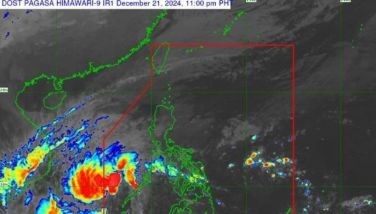Students develop device that can help detect seism
CEBU - Students of the University of San Carlos are now developing a low-cost monitoring system that can help the Philippine Institute of Volcanology and Seismology improve its findings.
The remote monitoring system for data transmission is translated in a device that can detect ground movement in event there is an earthquake.
Just recently, an intensity meter prototype developed by the five fifth year Electronics and Communication Engineering students of USC was chosen by PHIVOLCS as the best prototype among the other entries developed by other participating schools that have partnered with SMART Communications in its program that involves the academe and the government for a project that would help the whole community.
Jenes Rellen, Angelo Dominic Goh, Jade Malinao, Ryan Paderna and Teodulfo Parreño III are now starting to make improvements in their initial work as suggested by the PHIVOLCS so it could be used officially by the agency to help in monitoring of earthquakes in the country.
When the prototype was chosen last October 30 during their presentation with the PHIVOLCS, it was the package of features that other prototypes from Ateneo de Davao University, University of Baguio and Adamson University were not able to surpass.
The students have developed a prototype that measures the intensity of the lateral ground movement that is the horizontal and the vertical movement of the ground. Transmission of data used WiFi technology to avoid problems in delays and to do away with wires and the use of Global Packet Radio System which is expensive.
Engr. Brandon Briones, the USC students’ coach, said that one of the special features of the prototype is its software that converts the measurement into units that are understandable to PHIVOLCS and the community. Another is the memory it can store as it can record up to a month of findings.
The USC students have created a database where all the measurements can be stored and recovered aside from its accessibility through the net. USC Computer Engineering Department has helped the group with this especially in the creation of the database and the microcontroller.
The group used accelerometer to measure the movement. The whole prototype itself cost them around P10,000 and its cost-effectiveness has contributed to its success.
Rellen said that what they are trying to develop now is a final prototype where they would integrate other good features that PHIVOLCS has found in other schools. These features and innovative solutions will complete their work, making the project a collaborative effort.
Rellen said PHIVOLCS suggested improving the device that it can distinguish an earthquake from a simple spike. And the time to be used must be uniform with the Global Positioning System standard time.
After the final product which shall be tested and accredited by PHIVOLCS, it will be deployed to the 11 partner schools of Smart Wireless Engineering Education Program which have committed to help improve disaster preparedness by researching and working on projects that would benefit the people.
“The efforts of these students show their desire to help the nation. The truth is that they are not getting any reward from this aside from the fulfillment and pride from having been chosen with the best work. Further efforts will be done out of good hearts just to help the community and give honor to their school,” Briones said.
“This is also a challenge for us especially that there are systems not familiar to us that we need to study. The challenge here is to make a device that complies with the national and international standards,” Rellen added. — Jessica Ann R. Pareja/WAB (THE FREEMAN)
- Latest
- Trending






















